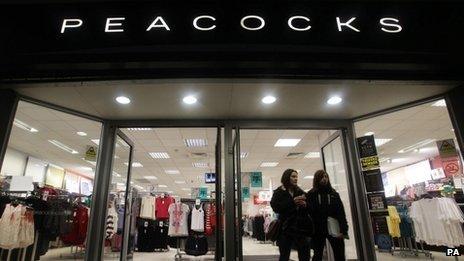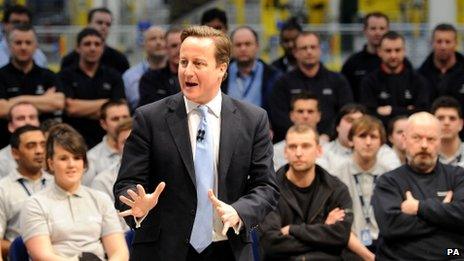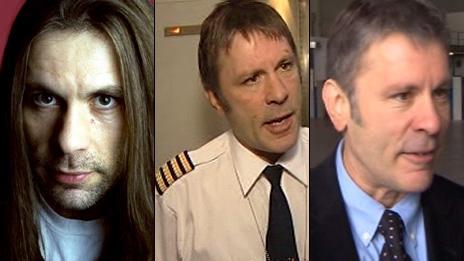Review of 2012: Not all gloom in flat year for Welsh business
- Published

The year started with bad news but Peacocks was eventually taken over by Edinburgh Woollen Mill
The year began in dramatic fashion with the collapse of the Cardiff-based retail chain Peacocks as a result of huge debts. At the time it was said to be the biggest corporate failure on the High Street since the demise of Woolworths.
The end result could have been worse, Edinburgh Woollen Mill took control with a pledge to invest £120m over the next two years and the head office functions remain in Wales.
The fall in and out of recession and the continuing problems in the Eurozone formed the backdrop to what was a pretty flat picture in Wales.
That said, the weekly flow of news wasn't as gloomy as some of the economic indicators suggested. Unemployment has ended the year well.
The unemployment rate is now just 0.1% above the UK average. On that basis, Wales is performing significantly better than a number of other parts of the UK.

Prime Minister David Cameron speaks to Airbus workers and apprentices on a visit to Broughton in December
It was a good year for major infrastructure projects, with the electrification of the Great Western rail line to Swansea being given the go-ahead and plans to build an £8bn nuclear power station on Anglesey getting back on track after a shaky moment.
In manufacturing, Airbus' wing making plant in Broughton has been enjoying bumper orders from airlines in the Far East, the latest was for 100 of its smaller passenger aircraft from the Malaysian operator Air Asia.
But it was a different story for another of Wales' huge manufacturers, Tata, which announced the biggest round of cutbacks at the Port Talbot steelworks in more than 20 years.
The construction of a new blast furnace on the site does give grounds to be optimistic about its long term future but the current state of the market has been desperate.

Bruce Dickinson - as heavy rock singer, pilot and head of an aviation company
Some new players entered the Welsh economy, such as Bruce Dickinson, the lead singer of the rock group Iron Maiden, who is heading up an aviation company at St Athan in the Vale of Glamorgan, and the high-tech engineering company Renishaw moved into the former Bosch factory near Llantrisant with ambitious plans to develop the vast site.
Malcolm Walker continued his remarkable story at Wales' biggest company, Iceland, when he took control of the firm in a management buy-out. The deal valued the company at almost £1.5bn.
And then arguably the biggest headline-grabbing announcement of the lot from the Welsh government came just last week when it said it wanted to buy Cardiff Airport to try to turn round its fortunes.
A potential deal will now be poured over before it's given the go-ahead in the spring. A commercial operator will be appointed to the run it on a day to day basis with the immediate priority of attracting more short haul destinations to stem the loss of passenger numbers.
It will be fascinating to see developments at the airport in the New Year, as will be progress at Wales' seven enterprise zones where discussions with potential new employers are said to be going well.